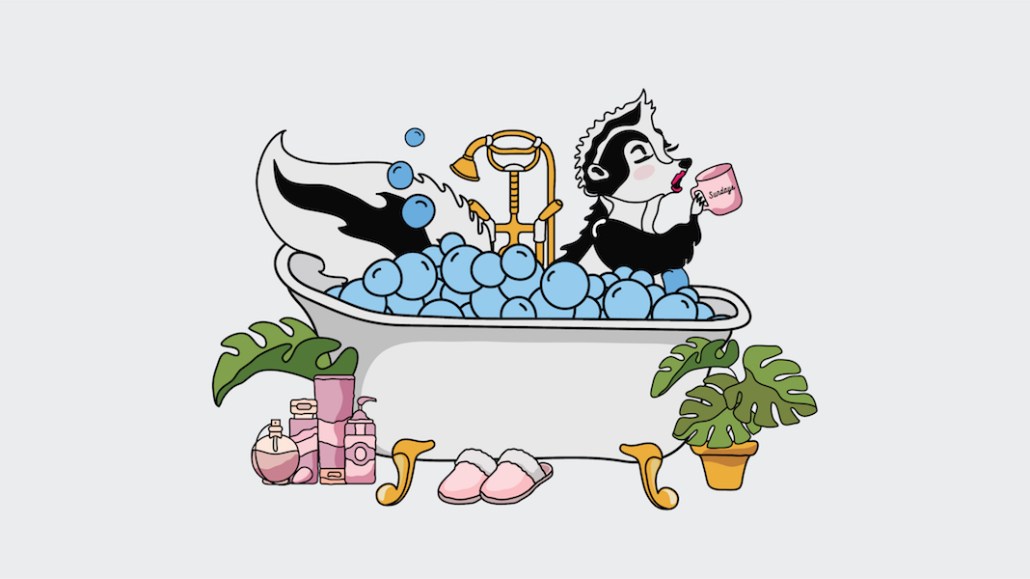Save 50% on a 3-month Digiday+ membership. Ends Dec 5.

Today’s workforce is claiming Sunday as a sacred, work-free zone.
The workweek is no longer largely confined to a person’s hours in the office. The widespread desire to set boundaries on work in the name of reserving “me time” has led to the rise of #SelfcareSunday, a hashtag-driven trend popularized by Instagrammers ranging from Kourtney Kardashian to Michelle Obama.
“There’s no longer a natural shutoff point,” says Ashley Merrill, CEO of luxury sleepwear company Lunya, which includes in its collection a Restore set that include pajamas, a sleep mask and a candle. “Our cellphones follow us everywhere. Everything is at our fingertips, and you could be communicating with people from work all the time.” She adds, “It’s created a whole shift and conversation about balance that we never had to have before. You have to actively create moments, days for yourself to unwind because the hustle never stops.”
The reason Sunday has become the important wind-down day is because workers use Saturday as a buffer day, to ease out of being in work mode, Merrill asserts.
Emily Parr, founder of HolliFrog Skincare, says she dedicates her Sundays to self-care, which for her includes taking back-to-back workout classes, walking her dog in New York City’s Central Park and ordering in (versus cooking a meal).
“The #SelfcareSunday movement came from the fact that everyone is trying to slow down a bit on Sunday — and because of that, they actually have the time to do that face mask,” says Parr.
Merrill echoes this theme, saying the impulse for Sunday-for-me routines stemmed from people becoming more purposeful about the ways they spend their free time.
Ad position: web_incontent_pos1
“Now you can do so much at home: You can order your dinner from Postmates; you can watch Netflix,” Merrill says. “You get time back when you do things at home, rather than go out. More people are choosing to spend it feeling like their best self,” she adds.
Marianna Hewitt, cofounder of vegan skin-care company Summer Fridays, says she takes time for self-care on Sundays to ensure that she will be prepared for what Monday brings.
“If I don’t take that time off, I don’t feel rested, and I don’t feel motivated or excited to start work up again,” Hewitt says. “I have work mode and I have time-off [zone], and giving myself boundaries and balance has made Sunday not too scary anymore,” she says, citing another popular hashtag, #SundayScaries. She named her Summer Fridays brand, launched in early 2018, after the wonderful feeling of claiming some personal time off, Hewitt explains.
And Hewitt’s skin-care company isn’t the only one piggybacking on the #SelfcareSunday trend. Influencer marketing platform provider Tribe Dynamics detected that the hashtag is driving an increase in earned media value for the top 50 skin-care brands. (EMV measures comments and likes about a brand on third-party social media content.) In the first 10 months of 2019, these 50 brands’ total EMV associated with #SelfcareSunday was 81% higher than for all of 2018.
Some people started documenting their self-care routines when, after pricey juice bars and boutique gyms multiplied, wellness became a status symbol, Parr says. But she questions whether all the images tagged with #SelfcareSunday represent authentic self-care routines.
Ad position: web_incontent_pos2
“Flaunting your wellness on social media has become a very cool thing,” Parr says. “People love to show a picture with their trainer; they love to snap their smoothie. ‘Self-care’ has become synonymous with providing trendy [social media] content.”
But for Parr, “When I’m practicing self-care, I’m not documenting it or taking the time to style a perfect picture,” she says. “I’m just present.”
More in Marketing

Ulta, Best Buy and Adidas dominate AI holiday shopping mentions
The brands that are seeing the biggest boost from this shift in consumer behavior are some of the biggest retailers.

U.K. retailer Boots leads brand efforts to invest in ad creative’s data layer
For media dollars to make an impact, brands need ad creative that actually hits. More CMOs are investing in pre- and post-flight measurement.
Ad position: web_bfu




